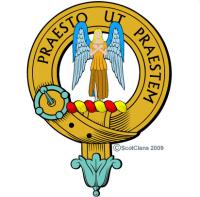
Clan Preston
The surname Preston comes from the barony of Preston, or Prestoun, which was later called Gourtoun, and then finally Craigmillar in Midlothian.
In 1222, Alured de Preston is recorded as a witness to a charter, and sometime between 1240 and 1250, Lyulph, son of Lyulph de Preston had a charter for a piece of land in Linlithgow from John Albus, which he later made over to Neubotel (now Newbattle) Abbey. It is said that there is an ancient link between this family of Prestons and the de Prestoun family in Ireland, who later became the Viscounts Gormanston.
A quitclaim by Johannes Gallard apud Muskilburg was witnessed, in 1248, by Johannes de Prestun, and in 1292, both William de Preston and Henry de Preston appear as charter witnesses.
Nicol de Prestone and William de Prestone from the Edinburgh area both signed the Ragman Roll in 1296, pledging their allegiance to England's Edward I.
In 1342, Sir John Preston managed to obtain a charter for the lands of Gourtoun, or Gorton. At the 1346 Battle of Durham, which was a decisve English victory, Sir John was captured, as was King David II. Both were eventually released, for the king that was after eleven years, after significant ransoms were paid.
Symone de Prestoun, in 1362, was burgess of Edinburgh, and, in 1363, Peter of Preston of Scotland was given back 13 marks which he had spent on jewels for Joan, David II's consort, who died the previous year.
An arm bone of Saint Giles was brought to Scotland from France by William Preston, and he gave it to the kirk of St. Giles in Edinburgh.
In 1470, clerk of the realm of Scotland, Alexander Preston, had safe conduct papers into England. In 1491 Will of Preston is recorded as a witness to a charter, and in the same year a Vill of Prestoune appears.
The provost of Edinburgh in 1557 was Sir Simon Preston of Craigmillar, and he gifted the land of Trinity Hospital.
The principal line of the Preston family ceased to exist after the death of Sir Robert Preston in 1639.
During the American Revolutionary War (1775-1783) Sir Charles Preston, 5th Baronet, commanded Fort St. Jean in Quebec during its seige. He returned to Scotland after the war, in 1784, and subsequently became the Member of Parliament for Dysart in Fife.






